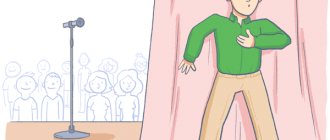Accept criticism
It is criticism (if it is adequate) that helps a person grow and develop. People with low self-esteem react with rudeness and irritability in response to criticism, perceiving comments as a personal insult. If you feel that your self-esteem is suffering, then this is the first thing you need to work on. If a person loves and values himself, then he is able to adequately perceive appropriate comments and work on his mistakes.
Adequately perceived criticism addressed to oneself as a sign of healthy self-esteem
Sports, performance and games
1. Do a fire show. Hone your technique of working with classic poi, staff (or even double, dragon staff), try out the rope dart. Don't want to waste time on technology? Okay, it will be easier with fans, and the viewer often loves them more. There are fire theaters, fire troupes and individual fire performers in all medium-sized and large cities, and in small ones there are always a couple of enthusiasts. And don’t forget to visit several fire fests in the CIS, most of them take place in the summer. Well, look at the performances of Ivan Gorbunov (Mel) on YouTube - it’s impressive!
2. Chess is a game of intellectuals. Finally learn how to play them! And not just rearrange the figures, but actually see the whole picture of the game and calculate the move; you will surely thank yourself when the opportunity arises to show off such a skill.
3. Waltz, polonaise, sirtaki, Argentine tango, zumba - there are a lot of popular types of dances, you will surely find something to suit your taste. The benefits of dancing are obvious: physical activity, keeping fit, improving body flexibility, and having fun. This is something everyone can learn in 3 months!
4. Contact juggling is not the easiest thing to do if you want to make a real performance out of it, but how unusual it is!
5. For fun, you can learn to walk on your hands, do the splits, do the Grand Jetée ballet jump (aka the split in the air), and juggle. For what? For fun!
6. Bridge is the only card game recognized as a sport, according to Wikipedia. So master it! How to learn to play bridge?
Be friends
Often friendships stretch from childhood and it is important that trusting relationships are maintained. A person needs a friend who can listen and give advice. If there are no old friends, learn to find new ones. Meet people, live in society, be open to communication.
Learn to communicate and make friends to feel like a full part of society
Communication and intellectual skills
1. Reciting poetry. It’s difficult to judge the practical benefits, but this is not an extra skill (if only because it resonates with the next point). Well, at the same time, memorize a dozen poems that you really like (whether it’s Ananasova, Yesenin or Rilke, it doesn’t matter!) - it’s good for your memory, after all.
2. Oratory will help you feel more confident at conferences, meetings, gatherings, and in everyday conversations. The art of public speaking is useful for both business and private life.
3. Negotiation is a skill that we so often lack even in everyday life. Make up for this by taking one of our business negotiation courses (usually lasting two to five weeks).
4. Learn to write with your second hand (left if you are right-handed, right if you are left-handed). We don’t comment, everything is obvious here!
5. Learn to go to a museum. Yes, yes, this is an art that few master! Read Johan Idem's book “How to Go to a Museum” to understand the beauty of this activity and learn how to really enjoy such cultural outings.
6. Languages. According to various estimates, to learn Spanish to a conversational level you need to spend about 200 hours of independent study. How long does it take to learn French? 300 hours. But even very basic Chinese will be difficult to learn over the summer: it takes about 1,500 hours. However, working with a tutor will speed up the process of learning a foreign language. How can you learn a second foreign language, knowing English, without tutors? Audio courses from Michelle Thomas will help! Plus vite nous commencerons, plus nous disposerons de temps!
7. An interesting thing to learn this summer is Gödel's theorem. It is presented in the book “Gödel, Escher, Bach: This Endless Garland.” Well, but it’s interesting!
8. Learn to correctly place punctuation marks according to Rosenthal. The directory is not as large as it seems, and therefore you can cope with it in less than a month. And you definitely don’t have to worry about making a bad impression on your emails. Agree, it's worth it!
9. Count quickly in your head, including multiplying three-digit numbers by each other. It's a good workout for the brain, and it's easy to learn - don't forget to practice every day and test yourself with a calculator.
Being alone
Some people simply cannot be alone and are always surrounded by other people. Situations can be different, for example, if a person moved to another city where he doesn’t know anyone. In this case, he will be forced to be alone for some time. It is important to be able to survive such a time without becoming depressed or panicking. Anyone who feels comfortable alone is always at peace of mind.
The ability to feel comfortable alone as a way to avoid emotional worries and fears
Believe in yourself and your strengths, be optimistic and open, don’t be ashamed to ask for help, be honest with the people around you and with yourself. Live and learn to enjoy life.
More interesting information on the topic in the video:
How to quickly learn anything: 6 main rules
Scientists have been studying for many years how to speed up the absorption of new knowledge. Sean Kim, author of Entrepreneur, provided some tips on this topic.
How great it would have been to know Spanish three years ago... How great it would have been to understand investing when I was only twenty years old...
If.
Many of us would like to be able to do much more than time allows us. And since the online world is full of information, we want to learn something new all the time. This means that the only variable we can control is the time we spend learning.
Scientists have been studying for many years how to speed up the absorption of new knowledge. Here are the most fundamental of these rules that will help you quickly learn anything from a new language to business skills or playing a musical instrument.
Don't reinvent the wheel
When we have to learn something new, we often try to do it alone and underestimate how much time and effort can be saved by asking someone who has already learned that topic or skill for help. Remember when you yourself studied something. It was difficult at first, but after a few years or even months you realize what you did wrong and can advise your friend to avoid such mistakes. Therefore, consult with leading experts in the field you need and use the path they followed to success. And you don’t have to get advice in person - if you don’t have suitable friends, read books, blogs, watch videos online. “Good artists copy,” said Pablo Picasso. “Great artists steal.”
Dismember the skill
This is another life hack in terms of learning. Break down the skill you need into its most fundamental parts. Choose the most important one - what you need to learn first. As we remember from the Pareto principle, 80 percent of results are achieved through 20 percent of efforts. And this can be applied in any area - in business, in assessing personnel, in assessing happiness or the quality of tourist trips.
This approach allows you to understand that success in any area of life - including learning - actually depends on several specific things. Accordingly, our task is to highlight those 20% that will give us 80% of the result. Speed learning experts have already adopted this technique. For example, Josh Kaufman says in his TED talk that you don't need to study 10,000 hours to master a skill. It's better to focus on the first 20 hours and learn the most important basic components of the desired craft that allow you to fit in that time. Research into motor and cognitive skills shows that the first few hours of training always produce the most dramatic gains.
Stop multitasking
We check our email every ten minutes, check our Instagram feed all the time, or take frequent breaks to chat with colleagues. This is one of the main obstacles to rapid learning.
Think about your computer. When you have 20-30 different tabs open in your browser, it starts to slow down, and new actions take more and more time. Research has shown that when we get distracted, it takes an average of 25 minutes to regain focus on a task. And yet, as one University of California study shows, the average worker exerts effort for only 11 minutes - and then begins to get distracted.
This also applies to long-term concentration. Many of us are unable to spend 6-12 (or even more) months learning a new skill due to new projects, ideas or hobbies constantly appearing. And when we decide to switch to something else, it is much more difficult to find the same interest and motivation to return to the previous skill.
Therefore, once you have identified the basic elements of a skill that will give you maximum results, focus only on improving them and do not take on any other new subjects until you have mastered them.
Repeat, repeat, repeat
This is what causes the most difficulty for most people. Many of us don't want to hear that learning something quickly requires practice. It requires regularity and persistence in rehearsing the same skill over and over again, to the point where you begin to do it subconsciously, without thinking. Leading experts in many fields do this, but don't talk about it much because emphasizing repetition is kind of no fun. But it is precisely this kind of practice that ensures mastery of skills, and not some innate talents.
Seek feedback—immediately
In 1960, when the Beatles were still an unknown school band, they went to Hamburg and played in local clubs there. They paid little there. The sound was terrible. The audience didn't care about them. So what did the Beatles get out of Hamburg? Hours of non-stop concerts, practice and immediate feedback that forced them to become better and better. This is one of the key components of the Beatles' success, wrote Malcolm Gladwell in his book "Geniuses and Outsiders." They weren't just practicing for the sake of practicing—they were trying to play in front of an audience that would immediately give them their criticism and their opinions. And the better they played, the more opportunities they got for such feedback.
In 1962 they played eight hours a night, seven days a week. By 1964, when they became international stars, the Beatles had already played more than 1,200 concerts together. Most bands today don't play 1,200 times in their lifetime.
Count on the long haul
Unfortunately, most of us abandon new projects during what Seth Godin calls a “slump,” or even before that. Godin says that while finishing a project on time is important in some cases, many potential winners don't succeed simply because they quit too early. Here's how it happens:
- you run out of time (and you quit);
- you run out of money (and you quit);
- you get scared (and you quit);
- you don’t take it seriously (and you quit);
- you lose interest (and quit).
Psychologists also describe the “cycle of transition”: this is the cycle that we go through during changes or some new events. At first we experience euphoria from the novelty. This is why we get so hooked on notifications from social networks, because every time there is a release of dopamine. But as soon as this “honeymoon” phase ends, we hit a “recession”, our progress begins to slow down. That's when most of us give up on a new business. This is very important: if you can anticipate this slump in advance when you learn something new, it is much easier to combat it. And even more important is this: those who are tenacious enough to overcome the decline are able to ride the new wave that waits on the other side.
So, the main rules:
— Repeat after the experts, don’t reinvent the wheel.
- Highlight the skill elements that bring 80% success.
- Forget about multitasking.
- Rehearse, rehearse, rehearse! And look for feedback.
- Play long and be aware of recessions.
Original
Interesting article? Subscribe to our mailing list to receive a weekly newsletter with announcements of the best materials from Ideonomics and other media and blogs.
Interesting article? Subscribe to our Telegram channel to receive more educational content and fresh ideas.
Develop creativity
Of course, what is worth learning is the creative profession. Perhaps creative skills will not allow you to earn big money, but there should be something for the soul, right? Try learning to draw. Even if you have never held a pencil in your hand and the most you can do is draw a flower with five petals, it doesn’t matter. Video tutorials on YouTube will teach you about basic drawing techniques. Who knows, maybe soon you will be able to draw a horse yourself.
Don't want to draw? Try your hand at photography. The world around is so beautiful that you want to stop a moment by capturing it on film. Find an object of inspiration and practice, someday your photographs will be the centerpiece of the best exhibitions in the world.
It doesn’t matter what you choose: designing, creating a masterpiece from matches or illustrating on a computer. The main thing is to approach this methodically, conquering new heights step by step.
To achieve success in other areas of life
Research shows that studying one subject can lead to success in other areas of life. The fact is that during the development of new information, many unique connections are formed in the brain with other current activities. In psychology, this phenomenon is called “indirect learning.” It was with his help that Einstein and other top inventors and artists achieved success. For example, Einstein realized the relativity of time during his work in the patent office. The Beatles studied foreign music and thanks to this they were able to become legends of rock and roll. One of the world's most famous chefs, Grant Akats, explored abstract art to find inspiration for his main business.
To communicate with people
New knowledge is needed in order to be able to discuss any topic, if necessary - including economics, politics, weather, sports and many others. A developed person must be able to take part in a conversation as an equal. And therefore, no one should rest on the laurels of existing knowledge - after all, in any case, they are always far from ideal. You can never guess where the acquired knowledge will be needed - at an important interview, while communicating with a girl, or in the company of new friends.
Learn the basics of design
Not everyone is born with a sense of style, but it can be developed. Of course, everyone's tastes are different, so what's good for some may seem terrible for others. Start with the basic classic design types and combinations. Try to improve the design of your home based on what you have learned.
Perhaps this skill will help you in your future work. In the end, aestheticism in any endeavor is never superfluous. Now there are many computer design programs that you can master on your own. And if you want to go further, sign up for courses where, under the guidance of professionals, you can develop and improve your skills.
Cook like a top restaurant chef
Tired of buckwheat for dinner and a sandwich for breakfast? Do you want something sophisticated? You have every chance to learn how to cook like the chefs of the best restaurants in the world. Go to YouTube and look for cooking tutorials. They will tell you step by step with detailed comments what to cook and in what order. We are sure that you will still be able to surprise your friends and family.
This skill will not let you fail in any situation. Once you have mastered the basic rules of cooking, start experimenting and finding your own solutions. You might even become the inventor of a new dish that will go down in history. Nowadays there are many culinary sites. What's stopping you from starting your own blog?
At the age of 18 a person must be able to...
Look at two situations that an adult must be able to handle—a life skill in itself: 1) illness outside the home and 2) car breakdown. Are we preparing for them? No, we don't cook.
Susan is an emergency room doctor at a hospital in downtown Washington. Nineteen-year-old students are her “most unpleasant patients.” Susan is a kind and loving woman, the mother of two children and three adopted children, all under eighteen. So I was a little surprised by her sarcastic tone.
“The students are generally healthy, and their parents take care of them at home. They come to our department with an upper respiratory tract infection - you might think it’s the end of the world. They get very nervous if you don’t give them an antibiotic and refuse to hospitalize them, but it’s just a cold - just drink more fluids and lie in bed for a couple of days.”
Susan tells how students burst into tears on the cold linoleum of the intensive care unit and cry on their mobile phones about this great grief - probably to friends and family. “They don’t know how to fight at all,” she says.
If you've ever planned a trip by car, you know that breakdowns are common. Todd Berger is the CEO of AAA Mountain West, a chapter of the American Automobile Association that covers Alaska, Montana and Wyoming. Seeing how needy millennial drivers are for support drives him crazy.
“Kids today are completely unprepared,” Todd says. He was born in Montana, owns a ranch and raises his own teenagers. When he talks about the life skills that are so lacking in most of the young people he now interacts with at work, there is both sternness and weariness in his tone.
The American Automobile Association's mission is emergency roadside service, not full service. They will change the tire, charge the battery, tow you somewhere, but will not deal with a comprehensive solution to problems with the car. However, young drivers demand full service on site.
“They have this mentality: “I don’t know anything, fix it quickly, my parents paid for it.” We also often notice that they don’t trust us. The team arrived, and they took out their phone and asked their friends on Facebook to help with the car. We don't know what to do with them. We really don’t know.”
LIFE
- getting a haircut: yes, yes, never thought about it? What if you decide to combine this “skill” with life in the wild, and the heat on the island becomes unbearable? In addition, you can tidy up your sideburns, goatee or any other element of your image;
- learn how to cook super deliciously - at least a couple of dishes from each category: soups, hot dishes, baked goods. It will definitely come in handy in life, not to mention the “wow” effect for family and friends;
- completing a law course will help you in life more than once;
- drive a car: as they say, you can learn to drive in an hour. But driving according to the rules may not only be enough for a month, but for your entire life. In this case, a month is a rather arbitrary period. But we are not talking about obtaining a license, but about having a license, but so far the lack of a real skill, that is, precisely about “skills” - the skills of driving a car and experience that comes over and over again;
- take extreme driving courses (if you find yourself in extreme situations where you need to make a difficult and only right decision). This may one day save not only yours, but dozens of other lives;
- take first aid courses: learn what to do when someone becomes ill or you find yourself near an accident;
- learn to quickly count in your head - try to do without your devices for a month;
And on the forums they advise to learn in a month... to be a husband and father! Because “being a family man is so great, and it will be very useful in life,” share forum members who are experienced and proficient in this “skill.”
After all, in life you need to have time to try everything, so go ahead, get the first “tick” on the list!
Text: Ekaterina Gerasimova
To be the first in your business
A person who learns something new every day in his professional field will always stay afloat. He will not be displaced by competitors, since every day he acquires new knowledge and skills. It is for this reason that after 1-2 years of inactivity, a specialist loses his value.
When a marriage on the verge of divorce can still be saved (10 signs)
Anna Khilkevich admitted to her subscribers that she believes in real men
A virologist explained at what age people are more likely to get sick with COVID-19 again
To improve the quality of attention
Obtaining new information allows you to train concentration, memory, and the ability to solve non-standard problems. After all, almost any learning process is based on visual and audio perception, which require the activity of the corresponding areas of the cerebral cortex. If these areas are engaged on a regular basis, they will begin to function better and better over time. At the level of perception, this manifests itself in the fact that a person becomes more attentive.
It is important that the eyelashes are well curled: how to prepare your face for a photo shoot
Environmental mission: famous hockey player Vyacheslav Fetisov heads VOOP
Correct geometry: classic dresses of the year that perfectly style your figure
To keep the brain young until old age
American professor Michael Merzenich spent many years researching the neuroplasticity of the brain and developing special exercises to maintain and improve cognitive functions. The researcher believes that one of the main reasons why the brain ages is a decrease in the speed of information processing.
BTS Named World's Best Selling Artists Of 2022 In The Music Industry
Funded by the city budget: restoration of the Gothic well at Orlov’s dacha
Trendy shade of spring 2022: ideas for fashionable coloring in “rose gold”
This happens because the brain in adulthood does not receive proper training. “During childhood,” explains Merzenich, “every person goes through a period of intensive learning. He constantly acquires new skills and abilities. An adult moves forward as a user of those abilities that he mastered at an early age. The main reason for the aging of the brain is that a person rarely takes on those tasks that require a high level of concentration and strain on his cognitive abilities.”
For example, activities such as reading a magazine, working in a known skill, or using one's native language are directly related to using existing skills rather than learning. By the time a person approaches seventy, his brain structures responsible for neuroplasticity have been languishing without regular training for about forty to fifty years.
Any workout changes the brain. When this happens, the number of neural connections in it increases. Gray and white matter begin to work better. Regardless of the nature of the cognitive load, it allows you to train your brain. And this is true for any age. After all, the brain has the ability to change, which is not lost even at 90 years old.
A Russian woman played at a landfill at -30 to urge people to save nature
A toy created based on a sketch by a 9-year-old Russian will appear in IKEA stores
What color should you decorate your interior in 2022: the most fashionable options named











